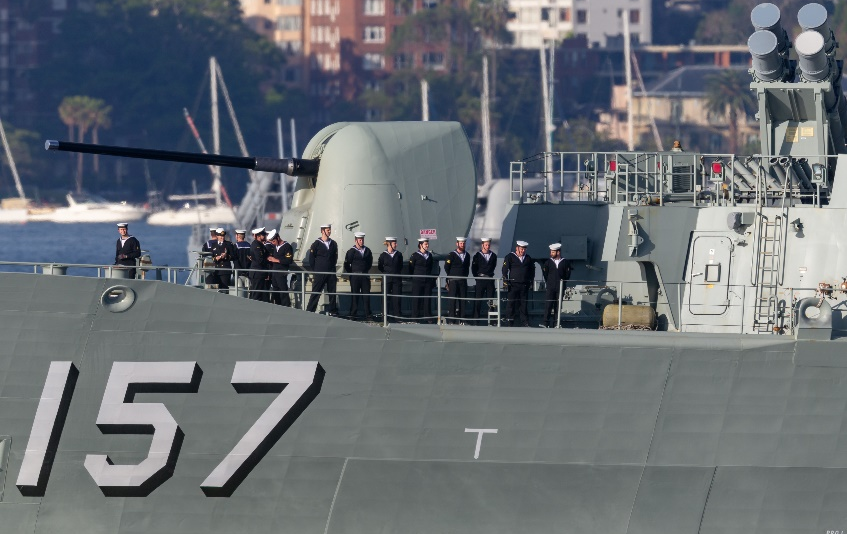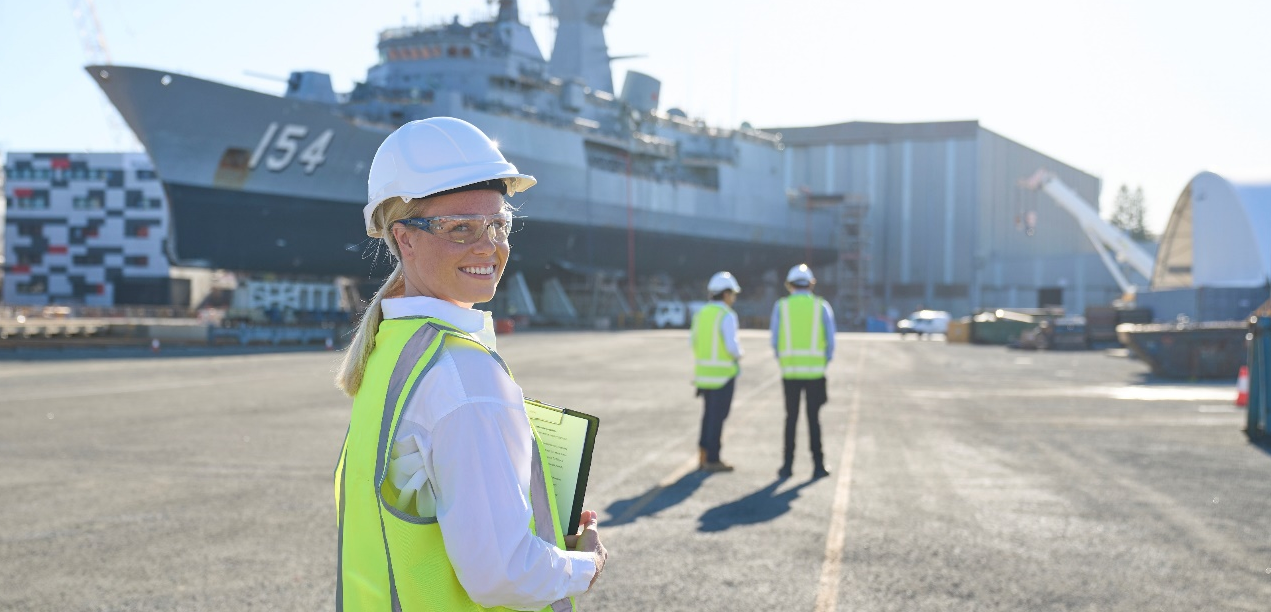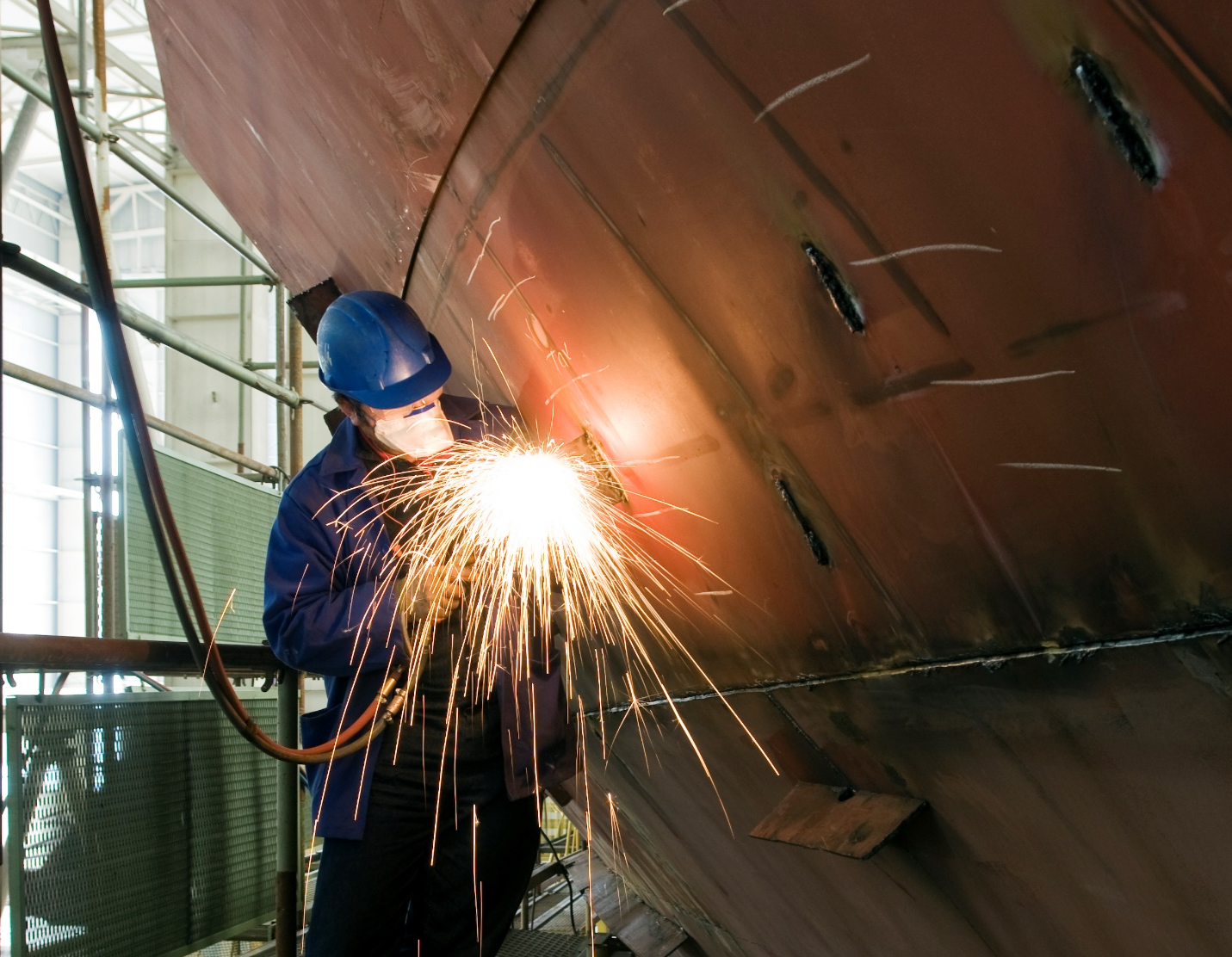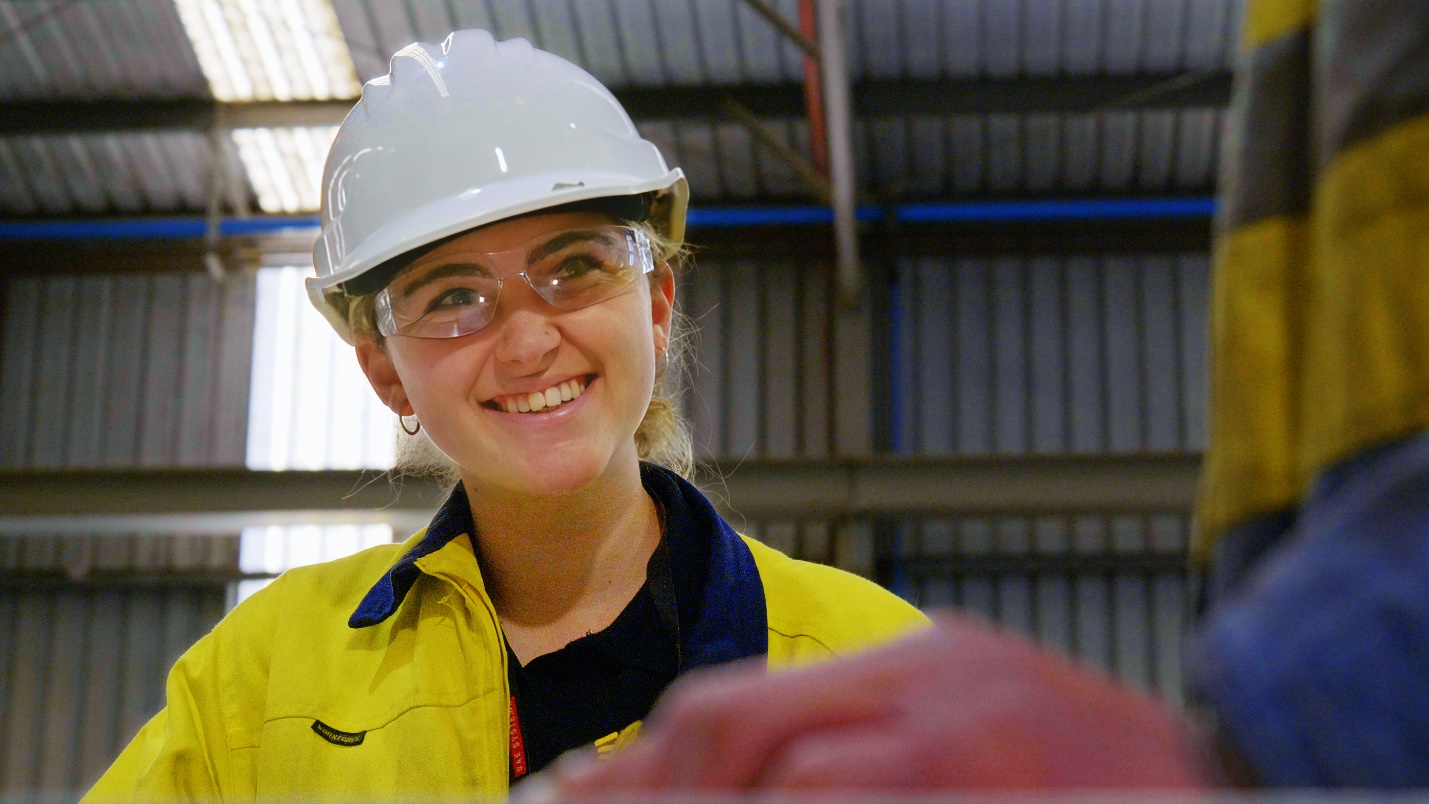Join the Australian defence workforce
For over a century, Australia’s Army, Navy, and Air Force have protected our nation.
At the same time, an army of civilian trades and technical professionals have played a crucial role in making sure those armed forces are equipped to carry out their missions.
To be involved in our defence industry is to be an elite practitioner of whatever trade or profession you follow. After all, the men and women in uniform rely on the quality of your work for their survival.
So, like them, you’ll be working in the service of your country.
Very few trades or professions offer that sense of purpose and satisfaction.

What’s the difference between the defence forces and the defence industry?
It’s an important distinction.
The defence forces are the uniformed branches of the Australian military - our Army, Navy and Air Force.
Australia’s defence industry on the other hand is a group of civilian organisations that support the military by providing equipment, technology and services used in (or which can be adapted for) the Australian Department of Defence supply chain and those of our allies.
Everything from manufacturing weapons and vehicles to developing advanced communication systems, providing logistical support and delivering services which contribute to national security as well as warfighting.
It’s a vital collaborative effort.
The defence forces rely on the defence industry for the tools and resources they need, while the industry depends on the forces to identify their needs and provide feedback on the effectiveness of the products and services.
Find out more here.
https://www.defenceindustry.gov.au/about
https://www.defence.gov.au/sites/default/files/2023-11/SA-Defence-Industry-Workforce-Skills-Report.pdf
https://www.defence.gov.au/about/strategic-planning/2024-naval-shipbuilding-sustainment-plan

How do I join the Australian defence industry?
There are multiple career pathways, but the main two are the university system or the Vocational, Education and Training (VET) sector.
If you choose to do a degree, you can gain insights and start your career through graduate programs like the Defence Industry Internship Program.
This can provide valuable ‘hands on’ experience and a foot in the door.
On the VET side, gaining an apprenticeship, such as an Electrician or Mechanical Fitter, or completing a traineeship in things like business administration or supply chain logistics are excellent options.
An apprenticeship typically requires a 3 to 4-year commitment, while a traineeship usually lasts 1 to 2 years.
In Adelaide or Perth, you can apply for a traineeship in the Defence Industry Pathways Program (DIPP). It’s a 12-month traineeship that includes IT, engineering, and logistics subjects, along with paid work at various defence industry providers.
If you’re based in Perth, you can apply to MEGT to join our rolling intakes. In Adelaide, you need to contact PEER.
Find out more here.
https://www.defenceindustry.gov.au/students
https://www.defence.gov.au/jobs-careers/student-pathways
https://www.southmetrotafe.wa.edu.au/defence-industry-pathways-program

What should I study at school?
The STEM subjects - broadly, Science, Technology, Engineering and Mathematics - provide the foundational skills and knowledge for a career in the defence industry.
While other subjects like fine art, drama, philosophy and music are important for personal growth and creativity, they don’t directly align with the technical demands of the defence sector.
Among STEM subjects, the following are most suitable to a career in the defence industry.
Mathematics
Maths is the foundation of many defence technologies including cryptography, data analysis and engineering calculations. By studying subjects like calculus, statistics, and applied mathematics, you can develop the problem-solving and analytical skills the defence industry needs.
Chemistry.
Chemistry plays a crucial role in the development of materials, fuels, and explosives used in defence. Understanding chemical reactions and properties can help you contribute to innovations in weaponry, protective gear and more.
Digital Technologies.
Cybersecurity and information technology are critical to national defence in the digital age. By studying computer science, information technology, and cybersecurity, you can help protect sensitive information and develop advanced defence systems.
Physics.
Like maths, physics is fundamental to understanding the principles that drive many defence technologies, from radar systems to missile trajectories.
Scientific Studies.
This encompasses a broad range of disciplines that contribute to defence research and development. Whether it's biology, environmental science, or interdisciplinary studies, a general science background leads to careers in research, development and innovation.
Design, Technology, and Engineering.
Disciplines such as mechanical, electrical, civil, and aerospace engineering are at the heart of defence technology development. Courses in design, technology, and engineering will give you the skills to build and maintain defence systems and infrastructure.
Find out more here.
https://www.defence.gov.au/jobs-careers/defence-aps-jobs/job-categories/stem-careers
https://www.defence.gov.au/about/strategic-planning/defence-industry-skilling-stem-strategy



What career paths will be open to me?

Engineering.
The defence industry relies on many specialised engineering disciplines to develop and maintain the advanced technologies and systems that support our national security.
Nuclear Engineering.
Want to be at the cutting edge? You’ll work in the design, development, and maintenance of nuclear reactors and other nuclear systems used in defence applications.
Mechanical Engineering.
This discipline focuses on the design, analysis, and manufacturing of sophisticated mechanical systems, such as defence vehicles, weapons and machinery.
Engineering Management.
You’ll oversee complex engineering projects, ensuring they’re completed on time, within budget and to the highest standards. Engineering Management demands a solid combination of technical knowledge and leadership skills.
Engineering Assurance.
This is about making sure engineering processes and products meet the stringent quality and safety standards demanded by our defence forces. That means conducting audits, inspections and testing to verify compliance with regulations and specifications.
Electrical Engineering.
Vital to the development and maintenance of electrical systems, Electrical Engineers keep defence force communication networks, radar systems and electronic warfare equipment running smoothly.
Combat Systems Engineering
This is all about managing the integration and maintenance of combat systems, including weapons, sensors and command and control systems. This discipline ensures that these systems work together seamlessly to achieve mission objectives.
Safety Engineering.
Your work will focus on identifying and mitigating risks associated with defence systems and operations. Safety engineers work to ensure all systems and processes are safe for personnel and the environment.

Operations.
This is the defence industry front line. Operations specialists take the things Engineers design and operate and keep them running smoothly on a day-to-day basis.
Fabrication Operations.
Mostly the work of Boilermakers and skilled Welders, fabrication involves the manufacture and assembly of components and systems for defence applications. It requires precision and attention to detail to ensure all parts meet required specifications.
Mechanical Operations.
This includes the maintenance and repair of mechanical systems, such as vehicles and machinery. Operators like Mechanical Fitters need a strong understanding of mechanical principles to troubleshoot and fix issues quickly.
Electrical Operations.
As a trades qualified Electrician, you’ll be familiar with all kinds of electrical systems, including wiring, circuits, and electronic components, with a talent for diagnosing and repairing electrical faults to ensure all systems function correctly.
Operators.
These all-rounders are responsible for running and maintaining various types of defence equipment and machinery. They need to be proficient in operating complex systems and ensuring that they run smoothly and safely.
Purchasing and Subcontracts.
You’ll manage the procurement of materials and services needed for defence projects. This requires strong negotiation skills and the ability to manage contracts effectively.
Piping Operations.
This discipline focuses on the installation and maintenance of piping systems used in critical defence applications. This includes ensuring all pipes are correctly installed and maintained to prevent leaks and other issues.
Nuclear Operations.
A field at the forefront of Australia’s next generation defence industry, you’ll have the specialised knowledge and expertise needed to ensure the safe and effective operation of nuclear systems.
Inventory, Warehouse and Logistics.
This area involves managing the storage and distribution of materials and equipment. It requires strong organisational skills and the ability to manage resources efficiently.

Program Management
Effective program management is crucial for the successful execution of every defence project.
Finance.
Managing the financial aspects of a project, including budgeting, cost control, and financial reporting, ensures that projects are completed within budget and financial resources are used efficiently.
Corporate Management.
Leaders, strategic planners and key decision makers, defence industry Corporate Executives play a vital role in setting the direction for projects and ensuring they align with the overall goals and objectives of the organisation.
Project Management.
One of the key roles in defence industry, Project Managers plan, organise and oversee projects from inception to completion. They need to be adept at coordinating teams, managing timelines, and ensuring all project deliverables are met to the required standards.

Supply Chain
Effective supply chain management is crucial for ensuring that the defence industry operates smoothly and efficiently.
Project Scheduling.
Schedulers manage the costs associated with defence projects and ensure they stay within budget. Additionally, scheduling skills are necessary to ensure that all project milestones are met on time and resources are allocated efficiently.
Commercial Management.
Commercial Managers handle negotiations, manage contracts and forge relationships with suppliers and vendors. Strong commercial skills ensure that the defence industry can procure the necessary materials and services at the best possible terms, contributing to the overall success of defence projects.

Support Functions
As the name suggests, support staff are crucial to the seamless operation of the defence industry. Essential skill areas include security, information technology, administration and human resources. Each plays a vital role in ensuring that the defence industry functions effectively.
Security.
For the defence industry, protection of highly sensitive information, assets and personnel is paramount. This involves enforcing physical security measures, cybersecurity protocols and risk management strategies. Security professionals work to prevent unauthorised access, detect potential threats, and respond to security incidents.
Information Technology (IT)
Defence industry IT professionals are responsible for maintaining and supporting highly sensitive computer systems, networks and software applications. They ensure that all technological resources function correctly and securely and provide technical support to users.
Administration
Administrative professionals handle day-to-day tasks such as correspondence, record-keeping and office management. They ensure all administrative processes run smoothly and efficiently, supporting the overall functioning of the organisation.
Human Resources.
HR professionals are responsible for recruiting, hiring, training, and developing employees. They also handle employee relations, benefits administration, and compliance with labour laws. HR plays a crucial role in ensuring the defence industry has a highly skilled and motivated workforce.

